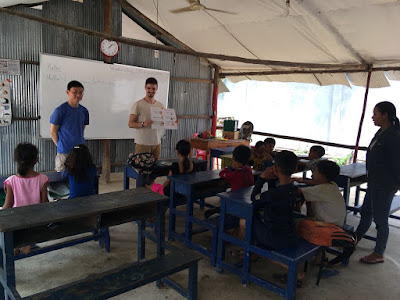Jeffrey in Cambodia: "if you contribute to improving their living conditions, the solidarity trip is already worth it"
| Jeffrey during his solidarity trip to Cambodia. Friendship is part of the adventure. |
A few months ago, Jeffrey travelled for two weeks to Cambodia to collaborate with the English language school for underprivileged children and young people. This was her experience:
The Cambodia project is the last one we have incorporated, why did you choose it?
I was simply interested in getting to know that part of the world.
Have you done a solidarity trip before? What made you decide to do it again?
Yes, the previous experiences were great: I met new cultures, very interesting people, and I also helped in any way I could.. What made me repeat is that it is the best way to get to know a culture, since you live with local people and you also contribute with your grain of sand to improve their living conditions.
 |
| Jefrrey with other volunteers from the project. |
What did you know about Cambodia before your trip?
I knew history of the Khmer Rougeand that his country is home to the temple of Angkor Wat, as well as its geographical location.
And now, can you tell us 3 things you have learned about the country that have caught your attention?
1. Even if they have recently suffered a dictatorship, they are still smiling and friendly people. 2. It is a poor country, and many people need help, but they are not greedy. For example, the driver who took me to see the Angkor Wat temples on the last day told me to pay him whatever I wanted, even though I needed the money. 3. They value what they have, even if at first glance it is little.. For example, the school director and his family live in a shack, when they could live in the houses they have for volunteers.
 |
| Repairing bicycles was one of the tasks Jeffrey performed in Cambodia. |
How was your arrival at the project and your first impressions?
The arrival was good, the other volunteers welcomed me very well. My first impression is that is a highly organised school with a stable system of education.The best I have ever seen (being one supported by volunteers, of course).
What exactly did you do in the project?
Dar english classes twice a day from Monday to Friday and repairs and bicycle maintenance (flat tyres, brakes and gears out of adjustment, unblocking saddle locks). In the morning we prepared the lessons, ran errands, or in my case, fixed the bikes. After lunch we taught English classes until the evening.
 |
| Jeffrey taught English in the afternoons. |
What were your pupils like?
My students in the morning were small (up to 11 years old). In the afternoon, they were teenagers and adults. At the end-of-year party, they got me wet.... and me leaving them!
Is there a story from one of your students that particularly caught your attention?
There was a pair of brothers, and one of them was very young, but at the same time very mature. And the best student! I imagine it has to do with having had a hard life.
What was it like living with other volunteers?
I met several people, most of them European. The relationship was very good, although at the beginning it was noticeable that I was a novice, and the other had more experience. As the days went by, it got better. The conviviality was greatIn fact, I became very good friends with one of them.
| On his solidarity trip, he also went sightseeing and visited temples. |
What advice would you give to someone who is going on the same solidarity trip as you?
That it carries erasable markers for blackboards. The ones there deteriorate very quickly. Also tools for bicycles (e.g. disassemblers).
Would you repeat a solidarity trip? Why?
Of course. It is the best way to get to know a cultureTheir way of life, their customs and their way of thinking. On the other hand, they always teach you something, and I would go so far as to say that after a solidarity trip, you always take back more than you brought with you. And if you contribute to improving their living conditions as much as possible, even if it's only a small part, it's worth it.



